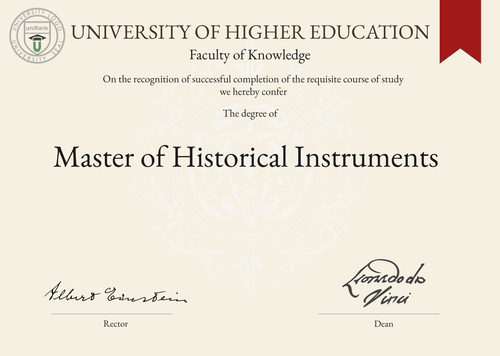
Master of Historical Instruments (MHI)
Guide to Master of Historical Instruments Program/Course/Degree
Master of Historical Instruments (MHI)

Program Name
Master of Historical InstrumentsProgram or Degree abbreviation
MHIDuration range
The duration of the Master of Historical Instruments program can vary depending on the country or university, typically ranging from 1 to 2 years.Tuition range
Tuition fees for the Master of Historical Instruments program can vary depending on the country or university, typically ranging from $10,000 to $30,000 per year.Overview
The Master of Historical Instruments program is designed to provide students with in-depth knowledge and skills in the field of historical musical instruments. This program focuses on the study, preservation and performance of instruments from different historical periods.Curriculum Overview by year
The curriculum of the Master of Historical Instruments program is structured to provide a comprehensive understanding of historical instruments. The coursework typically includes: Year 1: - Introduction to Historical Instruments - History of Musical Instruments - Instrument Construction and Restoration - Performance Techniques on Historical Instruments Year 2: - Advanced Studies in Historical Instruments - Research Methods in Musicology - Special Topics in Historical Instruments - Master's Thesis or ProjectKey Components
The key components of the Master of Historical Instruments program include: - Study and analysis of historical instruments - Instrument construction and restoration techniques - Performance techniques on historical instruments - Research and scholarly writing in the field of historical instrumentsCareer Prospects
Graduates of the Master of Historical Instruments program can pursue various career paths, including: - Instrument curator or conservator in museums or cultural institutions - Instrument maker or restorer - Music educator specializing in historical instruments - Performer or member of historical instrument ensemblesSalary Expectations
Salary expectations for graduates of the Master of Historical Instruments program can vary depending on factors such as location, experience and job position. On average, professionals in this field can earn a salary ranging from $40,000 to $80,000 per year. For a more accurate understanding of salary expectations, you can utilize the Job Sites Search Engine, from our sister site jobRank, which searches over 4,600 job sites worldwide. Make sure to specify not only the job title but also the country you are interested in.Conclusions:
It is important to note that the duration, tuition fees, curriculum, key components, career prospects and salary expectations of the Master of Historical Instruments program can vary depending on the chosen country or location of study, as well as the chosen university. Prospective students are advised to research and compare different programs and institutions to find the best fit for their academic and career goals. Visitors interested in pursuing a Master of Historical Instruments degree can use the uniRank World Universities Search Engine to search for programs offered anywhere in the world. This search engine provides a comprehensive database of universities and their respective programs, allowing individuals to find the right program that suits their needs and preferences.World Universities Search Engine
search for Master of Historical Instruments (MHI) and add the Location (country, state etc.) or specific University you are interested in studying at.
Query examples:
- Master of Historical Instruments (MHI) United States
- Master of Historical Instruments (MHI) United Kingdom online
- Master of Historical Instruments (MHI) Australia international students
- Master of Historical Instruments (MHI) University of California
- Master of Historical Instruments (MHI) University of London tuition fees
- Master of Historical Instruments (MHI) University of Sydney scholarships
Share Program/Course
Interesting? Share this program/course/degree info with your friends now.